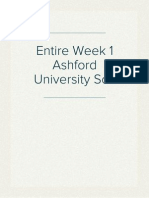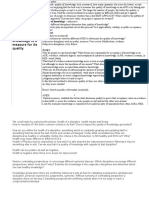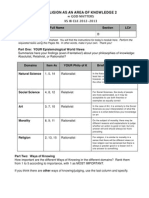CLE Synthesis 1
CLE Synthesis 1
Uploaded by
aarondy7Copyright:
Available Formats
CLE Synthesis 1
CLE Synthesis 1
Uploaded by
aarondy7Copyright
Available Formats
Share this document
Did you find this document useful?
Is this content inappropriate?
Copyright:
Available Formats
CLE Synthesis 1
CLE Synthesis 1
Uploaded by
aarondy7Copyright:
Available Formats
How do the philosophies of knowledge differ in their stance towards authority, opinion, and evidence/argument in the five (5)
areas of the Physical Sciences, Human/Social Sciences, Art, Morality, and Religion? That is, how do they use and/or rely on the different bases for justifying or evaluating claims in the different disciplines? Now that you have reflected on all this matter and have grown hopefully wiser, how would you use authority, opinion, and evidence/argument in the different areas?
DATA: Most Important Physical Science Human Science Art Morality Religion Least Important Physical Science Human Sciences Art Morality Religion Authority 22.64 24.07 25.93 33.96 60.81 Authority 15.38 34.62 46.81 28.30 8 Opinion 0 14.81 61.11 30.19 28.57 Opinion 59.62 51.92 12.77 43.40 32 Evidence 77.36 61.11 12.96 35.85 10.71 Evidence 25 13.46 40.43 28.30 60
There are many ways to prove that one thing is real, but there will always be the more correct way and the less correct way. These ways of proving can be trimmed to three, which are authority, opinion and evidence. In the five areas there are different ways of justifying claims. For example in the Natural Sciences, the most important is evidence while the least would be opinion. However, by looking at the first table at the top, the level of trust on authority is increasing. This is probably because in the sciences, authority may play a role, but their evidence would be much more important. However in art and morality, people would believe that they also have an opinion on the right thing. In religion on the other hand would be heavily reliant on authority, as it is founded on a person, which is Jesus. This then has shown how to prove a claim per each area. Also, it shows that there are more effective ways in proving a claim per area. From this data, I would use more of evidence in the sciences to make a conclusion. In Art however, my opinion would be valuable, but I think there is still a hint of authority as they would be the ones whose opinions will be listened to. In morality, however, requires the use of evidence, which is the law, authority, which is the judge or an elder, and opinion, which is the common people. Finally in religion, authority is important, so when Ill try do defend my point especially in class, Id have to quote the authority to be able to give a strong proof. Therefore, from this experience, Ive learn when to use each of the three to make people believe.
You might also like
- Sources of KnowledgeDocument4 pagesSources of KnowledgeDr. Nisanth.P.M86% (14)
- An Introduction To Science: Scientific Thinking and The Scientific MethodDocument9 pagesAn Introduction To Science: Scientific Thinking and The Scientific Methodputih_138242459No ratings yet
- Entire Week 1 Ashford University SocDocument12 pagesEntire Week 1 Ashford University SocAshesPasses100% (1)
- CLE EssayDocument1 pageCLE EssayZachary HawNo ratings yet
- Nature of ScienceDocument14 pagesNature of SciencePablo Dula AdoraNo ratings yet
- JudgeDocument11 pagesJudgeVanessa Angela Valdez RamosNo ratings yet
- Intro To Philosophy Doing Philosophy Lesson-2 StudentDocument36 pagesIntro To Philosophy Doing Philosophy Lesson-2 Studentaltheacasi2007No ratings yet
- Individual Assignment Final 2017Document21 pagesIndividual Assignment Final 2017Habtamu AdmasuNo ratings yet
- Through Different Methods of JustificationDocument4 pagesThrough Different Methods of JustificationInternational TutorNo ratings yet
- TOK EssayDocument7 pagesTOK EssayMohammed FayedNo ratings yet
- Ch3 Fundamentals of The Scientific Approach PDFDocument29 pagesCh3 Fundamentals of The Scientific Approach PDFIndri LianiNo ratings yet
- TOK Essay Titles Brainstorming Session Notes 2019Document4 pagesTOK Essay Titles Brainstorming Session Notes 2019shivaniNo ratings yet
- A Credo For What I BelieveDocument1 pageA Credo For What I BelievergolaoNo ratings yet
- Unit 4 Introduction To Philosophy Mulungushi University-1Document18 pagesUnit 4 Introduction To Philosophy Mulungushi University-1Bwalya FelixNo ratings yet
- Introduction To Philosophy ReviewerDocument10 pagesIntroduction To Philosophy ReviewerJake Aldred CabelaNo ratings yet
- Xsibcle2013 AOK Module2Document2 pagesXsibcle2013 AOK Module2nikotiutsNo ratings yet
- Science ChristianityDocument6 pagesScience ChristianityNopi BekNo ratings yet
- Xsibcle2013 AOK Module2Document3 pagesXsibcle2013 AOK Module2rtchua13No ratings yet
- Introduction To Science, Technology and SocietyDocument138 pagesIntroduction To Science, Technology and SocietyRahmat SaeediNo ratings yet
- A Reply - Lee Epstein, Gary KingDocument19 pagesA Reply - Lee Epstein, Gary KingAdam PeaseNo ratings yet
- Lewis Psy 116 Assignment 1Document5 pagesLewis Psy 116 Assignment 1Ezie Lewis AmobiNo ratings yet
- Xsibcle2012 AOK Module2Document2 pagesXsibcle2012 AOK Module2armandgozaliNo ratings yet
- In What Ways Can Disagreement Aid The Pursuit of Knowledge in The Natural and Human Sciences?Document7 pagesIn What Ways Can Disagreement Aid The Pursuit of Knowledge in The Natural and Human Sciences?Naina Hussain50% (4)
- TOK T1W1 Assignment - Belief in ScientistsDocument1 pageTOK T1W1 Assignment - Belief in Scientistsrahul.singaram.senthilkumarNo ratings yet
- Tok Natural ScienceDocument6 pagesTok Natural SciencetNo ratings yet
- A Holistic PerspectiveDocument3 pagesA Holistic PerspectiveJulie Ann Kate PalmianoNo ratings yet
- Handouts W2 PhiloDocument3 pagesHandouts W2 Philojorgebeyonce2007No ratings yet
- Methods of PhilosophizingDocument78 pagesMethods of PhilosophizingashtonNo ratings yet
- UntitledDocument69 pagesUntitledCatherine SaronaNo ratings yet
- Barua 2015 International Journal of Philosophy and TheologyDocument27 pagesBarua 2015 International Journal of Philosophy and Theologyromesh10008No ratings yet
- Phical Questions Have AnswersDocument3 pagesPhical Questions Have AnswersHa KDOG100% (1)
- Legal Persuasion TechniquesDocument47 pagesLegal Persuasion TechniquesNitish Verghese100% (1)
- Segerman ApproachesDocument4 pagesSegerman ApproachesJuan Francisco BazánNo ratings yet
- ScienceDocument70 pagesScienceßɭǟčk ÖpƨNo ratings yet
- Merged - Document Seminar 1Document15 pagesMerged - Document Seminar 1Cătălina AntoniuNo ratings yet
- Paths of Return (2009)Document190 pagesPaths of Return (2009)cgarrioNo ratings yet
- Science Vs Philosophy No Mans Land Between Science and ReligionDocument3 pagesScience Vs Philosophy No Mans Land Between Science and ReligionJmarie Brillantes PopiocoNo ratings yet
- Kelley, D - Logic - Cognitive BiasesDocument18 pagesKelley, D - Logic - Cognitive BiasesdiotrephesNo ratings yet
- Confirmation Bias - A Ubiquitous Phenomenon in Many Guises (Nickerson)Document46 pagesConfirmation Bias - A Ubiquitous Phenomenon in Many Guises (Nickerson)heliostevenNo ratings yet
- Diverse Bodies The Challenge of New Theoretical Approaches To Medical AnthropologyDocument12 pagesDiverse Bodies The Challenge of New Theoretical Approaches To Medical AnthropologyНестор ПилявскийNo ratings yet
- Sujay Skepticism Skeptopathy Coninuum FINAL FINAL FINALDocument16 pagesSujay Skepticism Skeptopathy Coninuum FINAL FINAL FINALSujay Rao MandavilliNo ratings yet
- Methods of PhilosophizingDocument14 pagesMethods of PhilosophizingRupelma Salazar PatnugotNo ratings yet
- The Science of Religion - by William S. HatcherDocument44 pagesThe Science of Religion - by William S. HatcherJheniefeer SayyáhNo ratings yet
- Intro To Philo Q3 W3 4Document22 pagesIntro To Philo Q3 W3 4Jay ar HernandoNo ratings yet
- Bus 1050 - e Portfolio AssignmentDocument2 pagesBus 1050 - e Portfolio Assignmentapi-316855446No ratings yet
- Activity 6 in STSDocument2 pagesActivity 6 in STSmonica bravo miloNo ratings yet
- ReasoningDocument14 pagesReasoningputri yustikaNo ratings yet
- Methods of PhilosophizingDocument23 pagesMethods of PhilosophizingFrances Vale BasanNo ratings yet
- Evolution FactsDocument14 pagesEvolution FactsjulianbreNo ratings yet
- Thesis Statement On TwinsDocument5 pagesThesis Statement On Twinsgxgtpggld100% (2)
- History of Philosophy: The Air Sorrounds in A More or Less Compressed State"Document3 pagesHistory of Philosophy: The Air Sorrounds in A More or Less Compressed State"Chris Deinielle Marcoleta SumaoangNo ratings yet
- L1-T1 final Moiz NaeemDocument3 pagesL1-T1 final Moiz Naeemmoiznaeem1.618No ratings yet
- Nickerson Confirmation BiasDocument46 pagesNickerson Confirmation BiasZeghaiderNo ratings yet
- Ku - Imagine A World Without Philosophy-1Document13 pagesKu - Imagine A World Without Philosophy-1FRANCIS GREGORY KUNo ratings yet
- Methods of PhilosophizingDocument13 pagesMethods of PhilosophizingJenezarie TarraNo ratings yet
- Learning Journal Unit 6 Epistemology and TruthDocument5 pagesLearning Journal Unit 6 Epistemology and TruthMoheud MalicNo ratings yet
- Philo QT ReviewerDocument20 pagesPhilo QT ReviewerEricka ArceNo ratings yet
- For Many Persons Science Is Considered The Supreme Form of All KnowledgeDocument13 pagesFor Many Persons Science Is Considered The Supreme Form of All KnowledgeMidz SantayanaNo ratings yet



























































